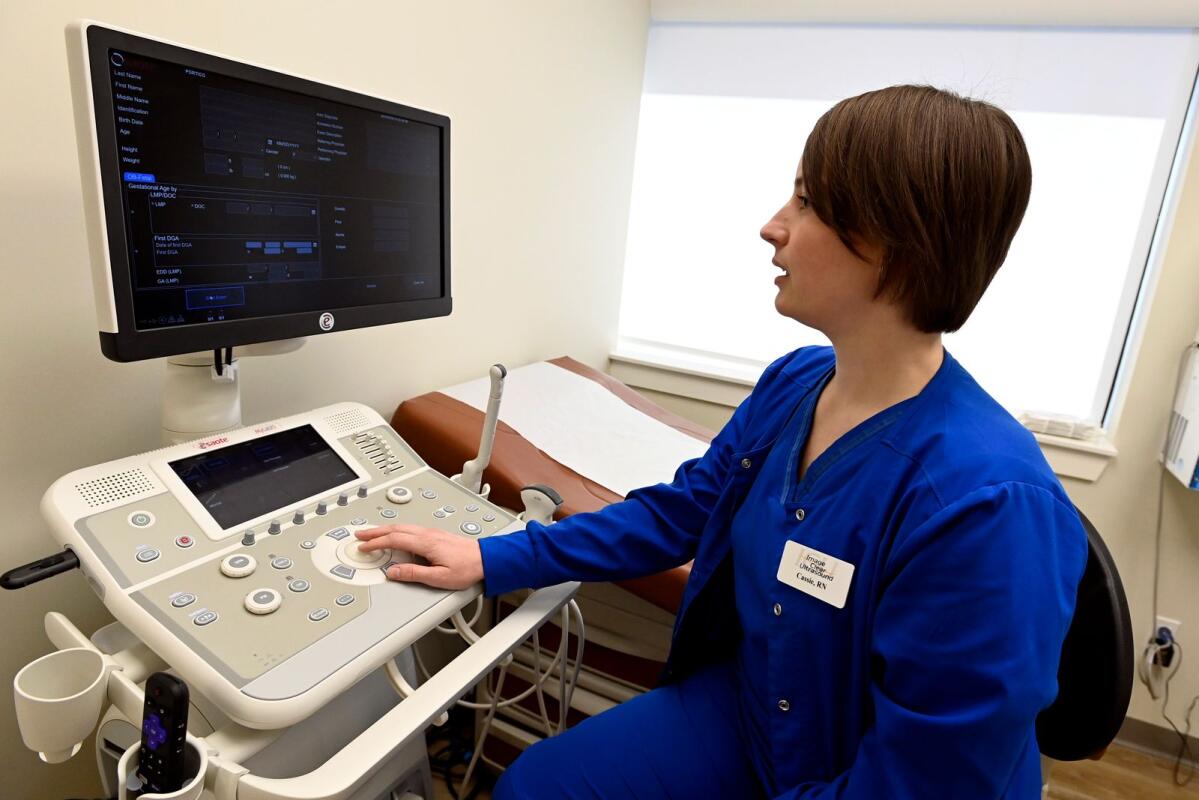Iowans speak out against bill making it easier to fund pregnancy centers
- By cigaretteman
- Off Topic
- 1 Replies
Iowans spoke out this week against legislation advanced by House Republican lawmakers that would make it easier for the state to funnel $2 million to pregnancy crisis centers that promote childbirth and discourage abortion.
The state has failed to find an Iowa nonprofit to oversee and administer a network of crisis pregnancy centers and maintain a record of the services provided to Iowans.
Lawmakers in 2022 created the More Options for Maternal Support — MOMS — program and last year approved $2 million for the stalled program. The state has failed twice to find a third-party administrator with at least three years of experience managing a statewide network of providers of pregnancy support services.
Abortion rights advocates oppose state funding for the pregnancy resource centers, saying they mislead women about their options and misrepresent themselves as legitimate medical providers.
The centers, which are usually religious-affiliated organizations that encourage childbirth or adoption and discourage abortion, are not fully licensed medical facilities. They typically offer ultrasounds, counseling, diapers and other baby items without cost.
An Iowa House subcommittee earlier this week advanced House File 2057 that would allow the Iowa Department of Health and Human Services to administer the program directly. The state could still opt to contract with an administrator, but the bill removes the requirement it have three years of experience managing a similar program.
Subcommittee members approved the bill 2-1, with Rep. Heather Matson, D-Ankeny, voting against.
“I do not think that it is a good idea to continue spending taxpayer dollars on programs that, first of all, are not moving forward because we cannot find an administrator that’s qualified, but also does not meet the needs in a genuine, completely honest way that every single Iowan deserves,” she said. Matson added that it is clear the program exists to exclude groups like Planned Parenthood that provide a range of reproductive health care, including abortion.
In 2017, Republican lawmakers chose to withdraw from a federally funded family planning program in favor of a state-run version that barred Planned Parenthood and other abortion providers. The year after it launched, the state’s Family Planning Program saw an 85 percent drop in use of services, which included those that provided birth control and information on how to prevent pregnancy, The Gazette previously reported.

Sign up for On Iowa Politics

Reps. Michael Bergan, R-Dorchester, and Tom Jeneary, R-Le Mars, voted to advance the bill to the full House Health and Humans Services committee.
"I'm interested in moving this bill forward to increase the discussion among a broader group of our Health and Human Services committee," Bergan said.
Tom Chapman, with the Iowa Catholic Conference, said the bill provides needed adjustments to the original law to allow the stalled MOMS program to move forward with the state taking on the role of program administrator.
"HHS, as you know, over the past couple of years has been performing their due diligence with groups that they didn't think were up to the job and we support them in that," Chapman said. "So we think this adjustment will help it be an Iowa-base program."
He said “pregnant women deserve more access to meaningful assistance and support when she needs it.”
Opponents said the bill would loosen accountability requirements for the state and third-party contractors administering the program, and could result in “illegitimate organizations” being eligible to receive millions of taxpayer dollars.
Representatives for the Family Planning Council of Iowa and Planned Parenthood Advocates of Iowa said the bill also reduces transparency for the public by removing the requirement for program administrator and subcontractor criteria to be published on the Iowa Department of Health and Human Services website.
“My concern here is that when we are unable to find a suitable administrator for the program, I don’t believe that answer is making it easier to become the administrator,” Mazie Stilwell, public affairs director for Planned Parenthood Advocates of Iowa, told lawmakers.
Lawmakers voted to advance the bill after hearing the personal stories of Iowans who said they had harmful experiences with anti-abortion centers, including using deceptive tactics and religious guilt to pressure them into not having an abortion and providing inaccurate medical advice.
Mica Chase, of Cedar Rapids, said 14 years ago at the age of 19 they went to a crisis pregnancy center that counsels against abortion. Chase said the option of a free pregnancy test and counseling “lured me in.”
“I faced moral judgments, shaming for uncertainties about the father, guilt-tripping and even attempted proselytization,” Chase told lawmakers. “Far from receiving factual reproductive health care, I encountered misinformation and lies. Leaving that place, self-proclaimed as a non-judgmental safe space, left me embarrassed.”

 www.thegazette.com
www.thegazette.com
The state has failed to find an Iowa nonprofit to oversee and administer a network of crisis pregnancy centers and maintain a record of the services provided to Iowans.
Lawmakers in 2022 created the More Options for Maternal Support — MOMS — program and last year approved $2 million for the stalled program. The state has failed twice to find a third-party administrator with at least three years of experience managing a statewide network of providers of pregnancy support services.
Abortion rights advocates oppose state funding for the pregnancy resource centers, saying they mislead women about their options and misrepresent themselves as legitimate medical providers.
The centers, which are usually religious-affiliated organizations that encourage childbirth or adoption and discourage abortion, are not fully licensed medical facilities. They typically offer ultrasounds, counseling, diapers and other baby items without cost.
An Iowa House subcommittee earlier this week advanced House File 2057 that would allow the Iowa Department of Health and Human Services to administer the program directly. The state could still opt to contract with an administrator, but the bill removes the requirement it have three years of experience managing a similar program.
Subcommittee members approved the bill 2-1, with Rep. Heather Matson, D-Ankeny, voting against.
“I do not think that it is a good idea to continue spending taxpayer dollars on programs that, first of all, are not moving forward because we cannot find an administrator that’s qualified, but also does not meet the needs in a genuine, completely honest way that every single Iowan deserves,” she said. Matson added that it is clear the program exists to exclude groups like Planned Parenthood that provide a range of reproductive health care, including abortion.
In 2017, Republican lawmakers chose to withdraw from a federally funded family planning program in favor of a state-run version that barred Planned Parenthood and other abortion providers. The year after it launched, the state’s Family Planning Program saw an 85 percent drop in use of services, which included those that provided birth control and information on how to prevent pregnancy, The Gazette previously reported.

Sign up for On Iowa Politics
Subscribe now and receive a roundup of Iowa politics news sent directly to your inbox.
Reps. Michael Bergan, R-Dorchester, and Tom Jeneary, R-Le Mars, voted to advance the bill to the full House Health and Humans Services committee.
"I'm interested in moving this bill forward to increase the discussion among a broader group of our Health and Human Services committee," Bergan said.
Tom Chapman, with the Iowa Catholic Conference, said the bill provides needed adjustments to the original law to allow the stalled MOMS program to move forward with the state taking on the role of program administrator.
"HHS, as you know, over the past couple of years has been performing their due diligence with groups that they didn't think were up to the job and we support them in that," Chapman said. "So we think this adjustment will help it be an Iowa-base program."
He said “pregnant women deserve more access to meaningful assistance and support when she needs it.”
Opponents said the bill would loosen accountability requirements for the state and third-party contractors administering the program, and could result in “illegitimate organizations” being eligible to receive millions of taxpayer dollars.
Representatives for the Family Planning Council of Iowa and Planned Parenthood Advocates of Iowa said the bill also reduces transparency for the public by removing the requirement for program administrator and subcontractor criteria to be published on the Iowa Department of Health and Human Services website.
“My concern here is that when we are unable to find a suitable administrator for the program, I don’t believe that answer is making it easier to become the administrator,” Mazie Stilwell, public affairs director for Planned Parenthood Advocates of Iowa, told lawmakers.
Lawmakers voted to advance the bill after hearing the personal stories of Iowans who said they had harmful experiences with anti-abortion centers, including using deceptive tactics and religious guilt to pressure them into not having an abortion and providing inaccurate medical advice.
Mica Chase, of Cedar Rapids, said 14 years ago at the age of 19 they went to a crisis pregnancy center that counsels against abortion. Chase said the option of a free pregnancy test and counseling “lured me in.”
“I faced moral judgments, shaming for uncertainties about the father, guilt-tripping and even attempted proselytization,” Chase told lawmakers. “Far from receiving factual reproductive health care, I encountered misinformation and lies. Leaving that place, self-proclaimed as a non-judgmental safe space, left me embarrassed.”
Iowans speak out against bill making it easier to fund crisis pregnancy centers
The state has failed to find an Iowa nonprofit to oversee and administer a network of crisis pregnancy centers and maintain a record of the services provided to Iowans.



